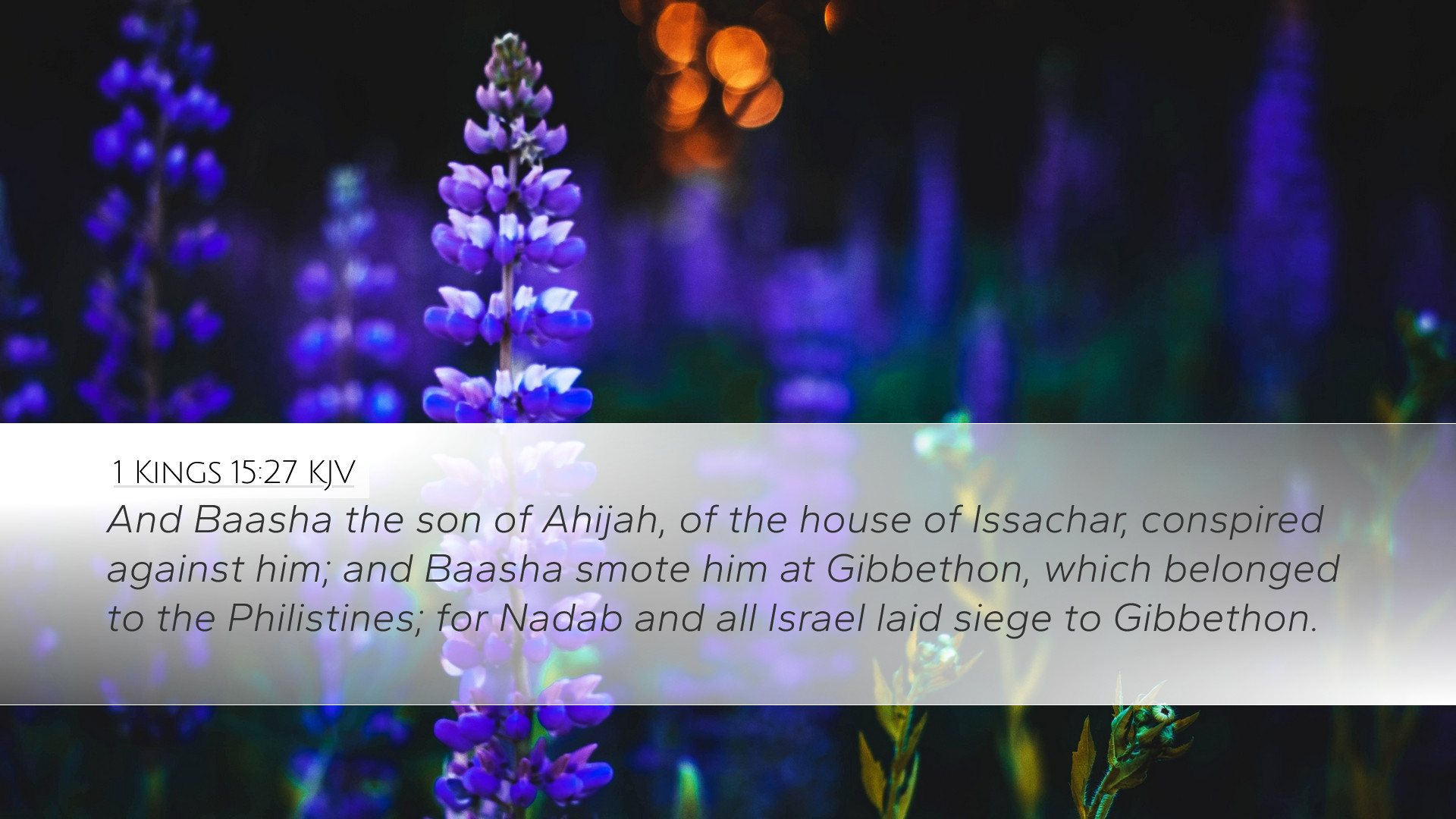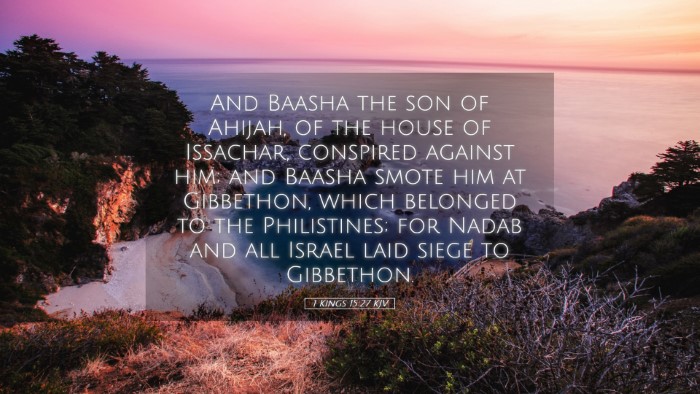Bible Commentary on 1 Kings 15:27
Verse: "And Baasha the son of Ahijah, of the house of Issachar, conspired against him, and smote him at Gibbethon, which belonged to the Philistines; for Nadab and all Israel laid siege to Gibbethon." (1 Kings 15:27)
Introduction
This verse marks a pivotal moment in the history of Israel, highlighting the political intrigue and violence of the monarchy. Baasha's conspiracy against Nadab is significant, not only as a power struggle but as fulfillment of divine prophecy. Here, we will explore the implications of this verse and its broader theological and historical significance through the insights of various public domain commentaries.
Historical Context
Commentators emphasize the importance of understanding the historical context of this verse. Baasha, a member of the tribe of Issachar, rose to power amidst ongoing strife within the kingdom. Nadab, the son of Jeroboam, had continued in the sins of his father, which had set a precedent for his downfall.
- Matthew Henry: Highlights that Nadab's reign was characterized by idolatry and evil, reflective of Jeroboam's legacy. His failure as a leader can be traced back to ignoring God’s commands.
- Albert Barnes: Notes that Baasha's actions were not merely political but also a response to the divine judgment upon Jeroboam's house. This reinforces the theme of divine sovereignty over earthly kingdoms.
- Adam Clarke: Provides an analysis of the city of Gibbethon, noting its strategic importance and the broader context of Israel's military campaigns against the Philistines at this time.
The Nature of Conspiracy
The method of Baasha's ascent is critical to understanding the depths of human ambition and moral compromise.
- Matthew Henry: Suggests that conspiracies stem from discontent and a desire for power, illustrating that sinful intentions lead to catastrophic outcomes.
- Albert Barnes: Points out that conspirators often attempt to cloak their treachery in justifications that may seem noble, yet are rooted in ambition and a hunger for control.
- Adam Clarke: Comments on the psychological aspect of conspiracy, suggesting that those who conspire often view their actions as necessary to achieve what they deem to be 'rightful' power.
Divine Judgment and Fulfillment of Prophecy
Baasha's ascent to power serves as a vivid demonstration of God’s judgment on Jeroboam's house.
- Matthew Henry: Reminds readers that the fall of Jeroboam's dynasty was foretold and is being realized through Baasha's violent usurpation. This emphasizes God’s control over the fate of kingdoms.
- Albert Barnes: Discusses how Baasha's actions fulfill the word spoken by the prophet Ahijah regarding the destruction of Jeroboam's lineage.
- Adam Clarke: Mentions the moral implications of God's judgment; it serves not only as a warning to kings but also as a lesson to the people regarding the consequences of sin.
God's Sovereignty in Political Affairs
Throughout scripture, political events are intertwined with theological truths. This verse encapsulates the idea that God Sovereignly directs the affairs of men.
- Matthew Henry: Affirms that the rise and fall of leaders are determined by God. Baasha's ascension, though treacherous, is a part of God's plan.
- Albert Barnes: Observes that the narrative serves to remind readers of the transient nature of human authority versus the enduring dominion of God.
- Adam Clarke: Points out the faithfulness of God to His word, illustrating that human understanding of politics is limited compared to divine wisdom.
Lessons for Today’s Leaders
The events surrounding 1 Kings 15:27 provide instructive lessons for contemporary political and spiritual leaders.
- The Importance of Righteous Leadership: Leaders must prioritize righteousness and obedience to God’s commands above their ambition.
- The Consequences of Sin: The narrative serves as a stark reminder of the social and political consequences of idolatry and injustice.
- Divine Accountability: Leaders will ultimately answer to God for their actions, an ever-relevant truth amidst the complexities of governance.
Conclusion
1 Kings 15:27 is more than a historical account; it encapsulates profound theological truths about the nature of God’s sovereignty, the consequences of leadership choices, and the importance of adhering to divine principles. The commentary provided by Matthew Henry, Albert Barnes, and Adam Clarke highlights the complexity of this verse, shedding light on the interplay between divine judgment and human action. By studying this passage, modern readers—pastors, students, theologians, and scholars—can glean essential lessons about fidelity to God in leadership and the importance of righteous governance.


